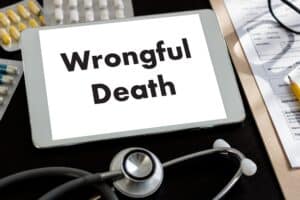Wrongful death refers to accidents in which someone loses their life due to the carelessness or inaction of another party. Sometimes, wrongful death deals with cases where someone was knowingly responsible for a loved one’s death. The definition of wrongful death can refer to both the passing of the individual and the legal action taken in response.
You can pursue either a wrongful death insurance claim or a lawsuit, depending on the circumstances of your case. A wrongful death lawyer can help determine which option suits your situation.
Grounds and Definitions for a Wrongful Death Case

Wrongful death cases arise due to deaths caused by:
- Negligence
- Deliberate action
Put simply, a wrongful death claim or suit deals with either accidents or intentional malice. The type of wrongful death case can dictate how it proceeds, but both versions aim to compensate beneficiaries for their losses.
Like a personal injury, wrongful death depends on demonstrating that it was more likely than not that someone caused a loved one’s passing. Claimants can use supporting evidence to bolster their cases.
Who Can Benefit From a Wrongful Death Case?
Wrongful death laws vary by state, including statutes regarding who can pursue compensation.
Typically, a case provides damages to family members like:
- Spouses
- Parents
- Children
- Siblings
- Grandparents
However, some states don’t allow family members to initiate legal action. Instead, a personal representative for the deceased’s estate can file on their behalf. In this scenario, family members still receive benefits but aren’t the ones directly initiating the claim or lawsuit.
Unfortunately, state statutes often don’t allow other loved ones to pursue a wrongful death case. For instance, if you lived with a long-term partner who then passed away due to negligence or violence, you may struggle to pursue a case since you were unmarried. The same is true in cases where the only surviving family members are less directly related, such as cousins or grandchildren.
Nonetheless, a good rule in any legal case is not to assume anything. You can check with a wrongful death attorney if you have any questions about filing a claim or lawsuit.
Damages Beneficiaries Can Receive From Wrongful Death Cases
Like many aspects of wrongful death cases, the damages you can pursue depending on where you live. In fact, compensation varies from case to case, as damages are dictated by each family’s specific losses. After all, the person lost was a singular individual, so the damages provided to their surviving family should reflect their hardships and absence.
Generally, damages fall into the following categories:
Funeral and Burial Costs
Wrongful death cases are often sudden, forcing families to shoulder unexpected expenses. The Federal Trade Commission (FTC) lists typical funeral costs, but expenses differ widely. Caskets, for instance, range from a couple of thousand dollars to $10,000 for certain materials.
Wrongful death benefits should provide compensation for a proper burial and memorial, including consideration for:
- Embalming
- Burial or cremation
- Caskets or urns
- Viewings
- Funeral services
- Graveside services
- Transportation
- Grave markers
Remaining Medical Bills and Lost Income
Not all wrongful death cases involve an immediate fatality. Your loved one may have undergone medical treatment prior to their passing. Other wrongful death cases involve long-term illnesses. You can fight to include the cost of end-of-life care services in your claim.
Attorneys can fight for compensation to cover:
- Emergency care
- Testing and imaging scans
- Surgeries
- Medical equipment
- Doctor consultations
- Medications
- Hospice
On top of medical bills, wrongful death should cover the lost income the deceased would have provided. For example, if you lost a spouse who was the primary wage-earner for your family, you now face financial hardships without that income. Your case would therefore involve pursuing compensation to cover that loss.
That said, your lost loved one doesn’t need to have been the main earner for you to pursue lost financial support. Any revenue they earned is potentially eligible, since it is income you counted on that no longer exists. Even side hustles and gigs could count.
Compensation for Intangible Losses
These damages reflect your loved one’s challenges. Here, compensation isn’t designed to replace or quantify their life, but to at least acknowledge certain struggles.
Examples include:
- Pain and suffering
- Emotional distress
- Loss of parental guidance
- Loss of spousal support
- Loss of companionship
As you can see, some of these damages depend on your specific relationship. A child of the deceased could receive consideration for the loss of advice and direction from a parent. A spouse can pursue compensation for the loss of intimacy, as well as help with co-parenting.
Punitive Damages
Some cases and states allow surviving family members to pursue punitive damages against the other party. Punitive means punishing—the compensation punishes the responsible party for causing this loss of life.
Some states don’t allow punitive damages. Others cap the amount you can receive. Generally, the courts reserve this compensation for particularly egregious cases, such as cases involving manslaughter or homicide. A lawyer can review your circumstances and explain whether your case could yield punitive damages.
Accidents That Can Lead to Wrongful Death Cases
Since wrongful death is defined as preventable loss of life from negligence or malice, a lot of scenarios fall under that definition. Recognizing common types of wrongful death can help you identify if your case qualifies for legal action.
Some negligent parties may try to brush off an accident as just an accident. Yet, if another party’s actions or inaction caused your loved one’s passing, you could have financial recovery options.
Roadway Accidents
These are unfortunately common grounds for wrongful death. In fact, recent studies by the National Highway Traffic Safety Administration (NHTSA) show a rise in traffic fatalities.
While not all roadway deaths result from negligence, human error plays a huge role. The U.S. General Services Administration (GSA) estimates as much as 98 percent of crashes arise from human error. The GSA highlights speeding, distracted driving, tailgating, and failure to look as among the most common errors—all examples of negligent behavior that could form the basis of a wrongful death case.
Fatal roadway accidents could involve:
- Automobiles
- Commercial trucks
- Buses and public transportation vehicles
- Trains
- Motorcycles
- Bicycles
- Pedestrians
- Scooters
Issues regarding liability can feel like a deterrent to pursuing compensation, especially when the other party has protection from their lawyers, insurers, and employers. If you lost a loved one to one of these accidents, you’re within your rights to consult with a wrongful death attorney.
Accidents Related to Medical Care
Johns Hopkins Medicine reports that medical errors are the third leading cause of death in the United States, making up 10 percent of all deaths. As a result, some wrongful death cases are against doctors, nurses, hospitals, and other healthcare staff.
Wrongful death due to medical malpractice can result from:
- Surgery or anesthesia errors
- Fatal birth injuries
- Misdiagnosis, wrong diagnosis, or late diagnosis
- Nursing home or care facility abuse
- Medication dosage errors
Grieving family members are sometimes intimidated by doctors and other staff who claim errors were unavoidable. While these cases require expert analysis and testimony, don’t get discouraged. A medical malpractice attorney can put their experience to use for your family.
Other Scenarios
Any of the following could also form the foundation of a wrongful death claim or lawsuit:
- Slip and falls
- Premises liability
- Dog attacks
- Boating or pool accidents
- Toxic exposure
- Construction accidents
- Workplace accidents
- Defective products
What to Know About Filing a Wrongful Death Insurance Claim
Although some wrongful death cases are resolved by civil action through a lawsuit, you can potentially recover compensation through an insurance claim. This doesn’t mean you can’t later pursue a wrongful death lawsuit, but it can allow you to settle without going to court.
This is sometimes preferable since court cases leave the verdict and compensation up to a jury. In an insurance claim, you typically have more control over the settlement amount. With the help of your legal representative, you can gather and present evidence of your family’s losses. Your lawyer could negotiate a settlement amount that covers everything.
For example, if you lost your loved one in a head-on truck collision, you could file a wrongful death claim with the trucking company’s insurance to receive a settlement. An adjuster can investigate the case, offer a settlement, and communicate with your representative to hammer out terms.
You may need to progress to a lawsuit if:
- You and the insurance company cannot agree on the terms, amount, or details of a settlement.
- The insurance company does not believe it is liable for the accident that caused your loved one’s passing.
- The other party involved in the wrongful death case was uninsured or underinsured.
- The other party’s insurance policy terms do not cover this specific type of accident.
- The insurance company operates in bad faith meaning it does not honor policy terms, rejects your claim without a reason, or makes unreasonable requests.
What to Know About Filing a Wrongful Death Lawsuit
Your wrongful death case may proceed to court to reach a resolution. In cases of deliberate death, such as manslaughter or homicide, many people bypass the claims process and file a lawsuit instead.
The steps of a wrongful death lawsuit are:
- You file the lawsuit paperwork against the other party, outlining your grounds for a wrongful death case.
- The other party responds to the complaint, typically disagreeing, which moves the case forward.
- Both parties conduct investigations, gathering evidence to support their cases.
- During pretrial discovery, both sides disclose evidence and information to make sure everyone works with the same evidence.
- Negotiations sometimes continue after pretrial discovery, which can allow the case to settle out of court.
- If the parties can’t settle out of court, the case proceeds to trial, where the surviving family members must demonstrate that it is likely the other party caused their loved one’s death.
- The jury rules on the case, determining if a wrongful death occurred and assigning what they believe is appropriate compensation.
Although most cases settle before going to trial, you should search for an attorney who understands litigation and everything in entails. That way, you can rest easy knowing they’re doing everything possible to advocate for what you need.
Civil Action versus Criminal Charges
Although some wrongful death cases revolve around crimes, civil cases differ from criminal ones in a few key ways:
- Civil cases are independent of criminal ones, meaning the verdict of one does not affect the verdict of the other.
- In lawsuits, families only need to demonstrate negligence or malice using a preponderance of the evidence, not beyond a shadow of a doubt.
- You can file a civil suit at any time within the statute of limitations, even if a criminal case is still ongoing or has concluded.
- Your loved one doesn’t have to have suffered a crime for you to file a lawsuit; accidents and negligence are still grounds for litigation.
Whether criminal charges apply to your loved one’s passing or not, you can potentially pursue a civil case. If you suspect that your family member lost their lives in a way that was preventable and caused by another person, you have options.
Wrongful Death Attorneys Can Evaluate Your Case

Wrongful death lawyers can determine if your loved one’s loss fits the definition of wrongful death. More than that, an experienced legal team can put together evidence and build a case for damages. Through it all, your lawyer represents you, taking on the burden of pursuing a legal case so that you can use that time to grieve.
If you have any questions about a fatal accident, many personal injury law firms in Phoenix offer free consultations where you can learn more.